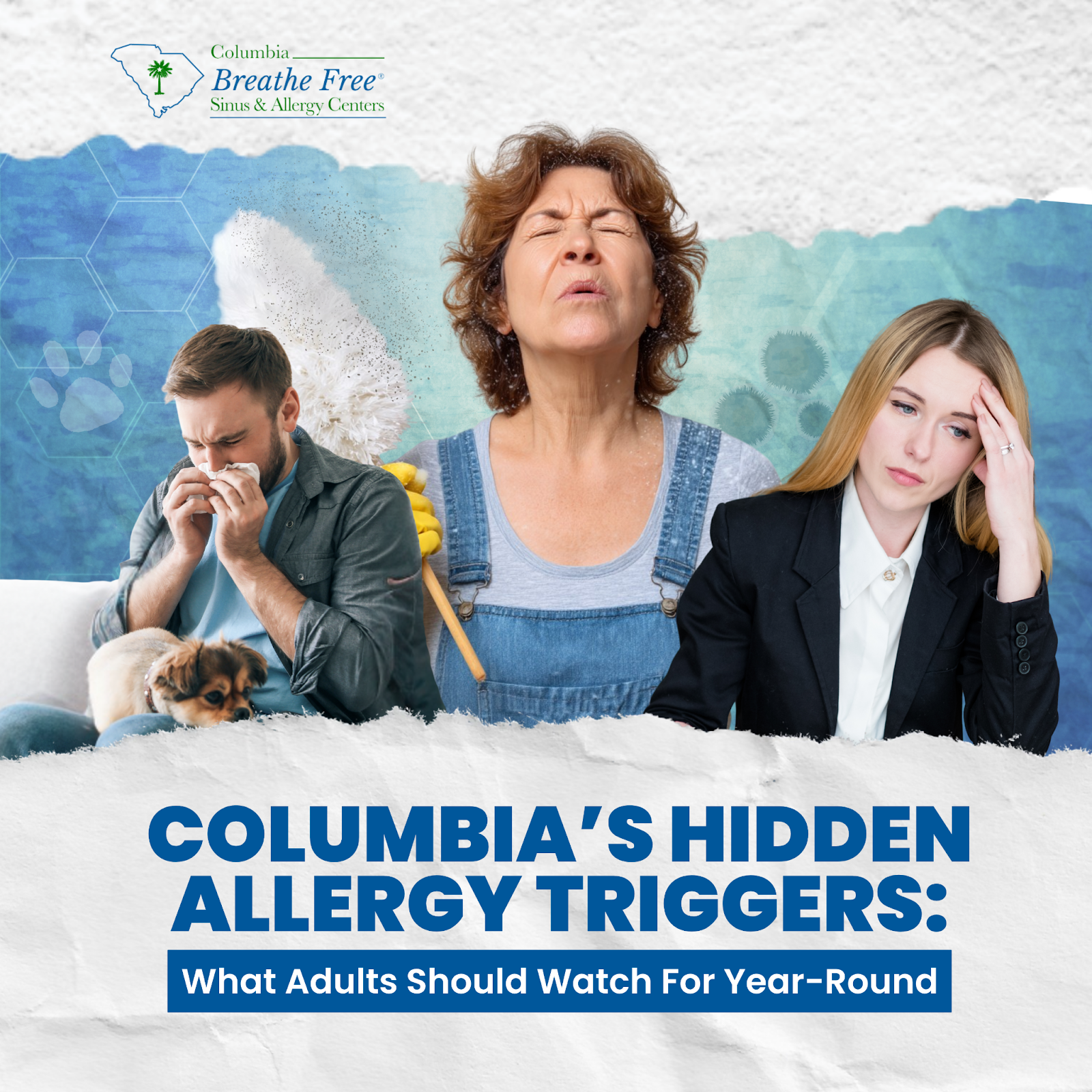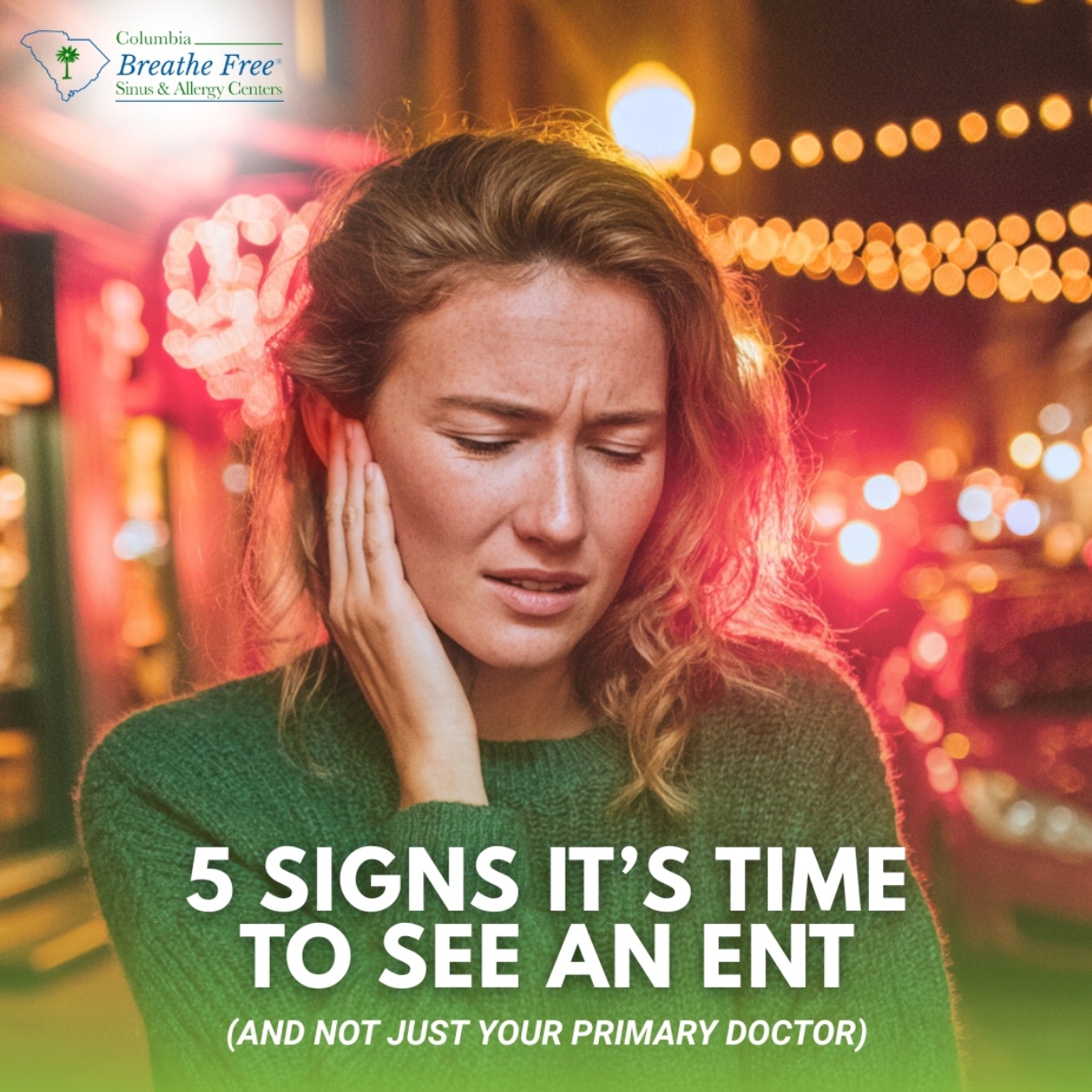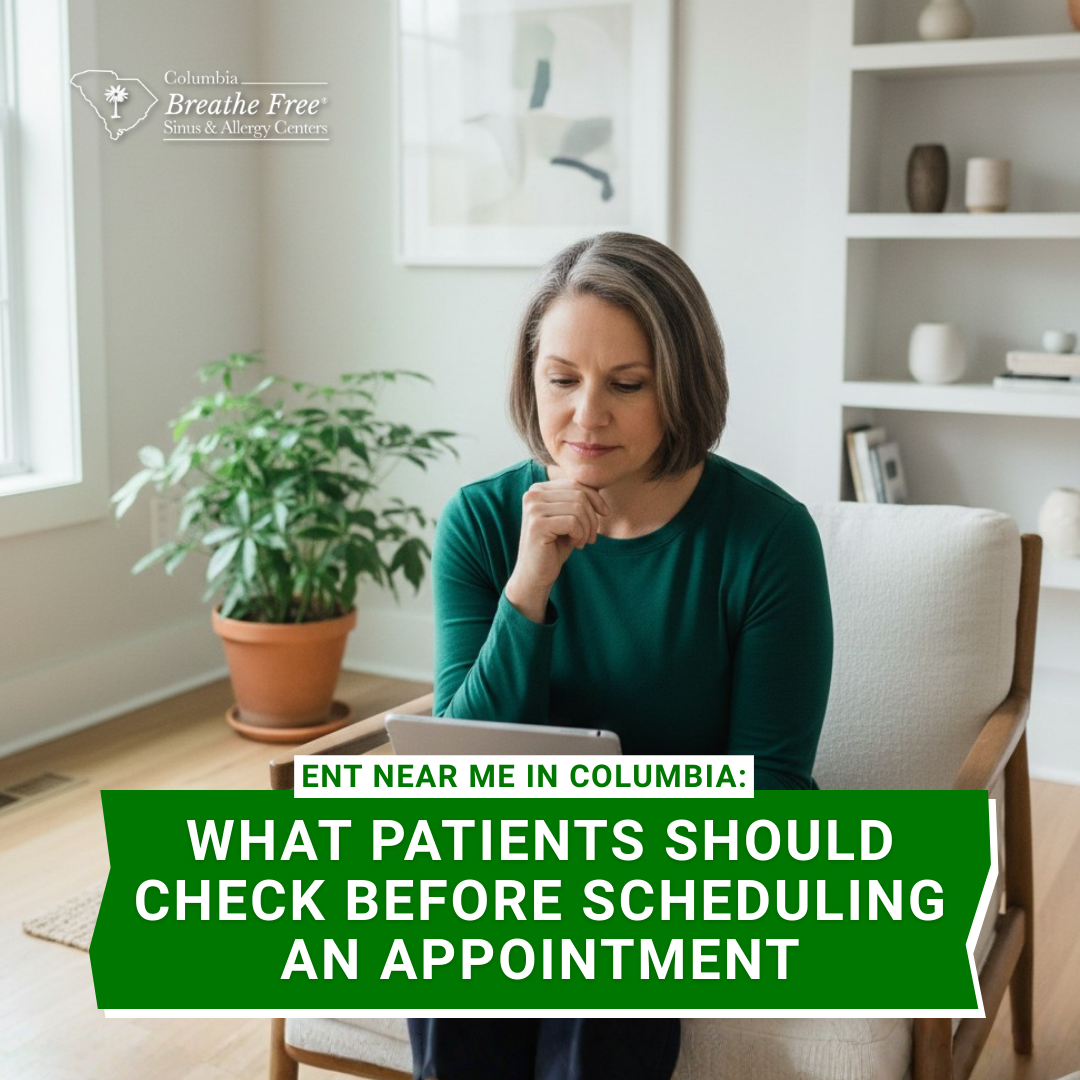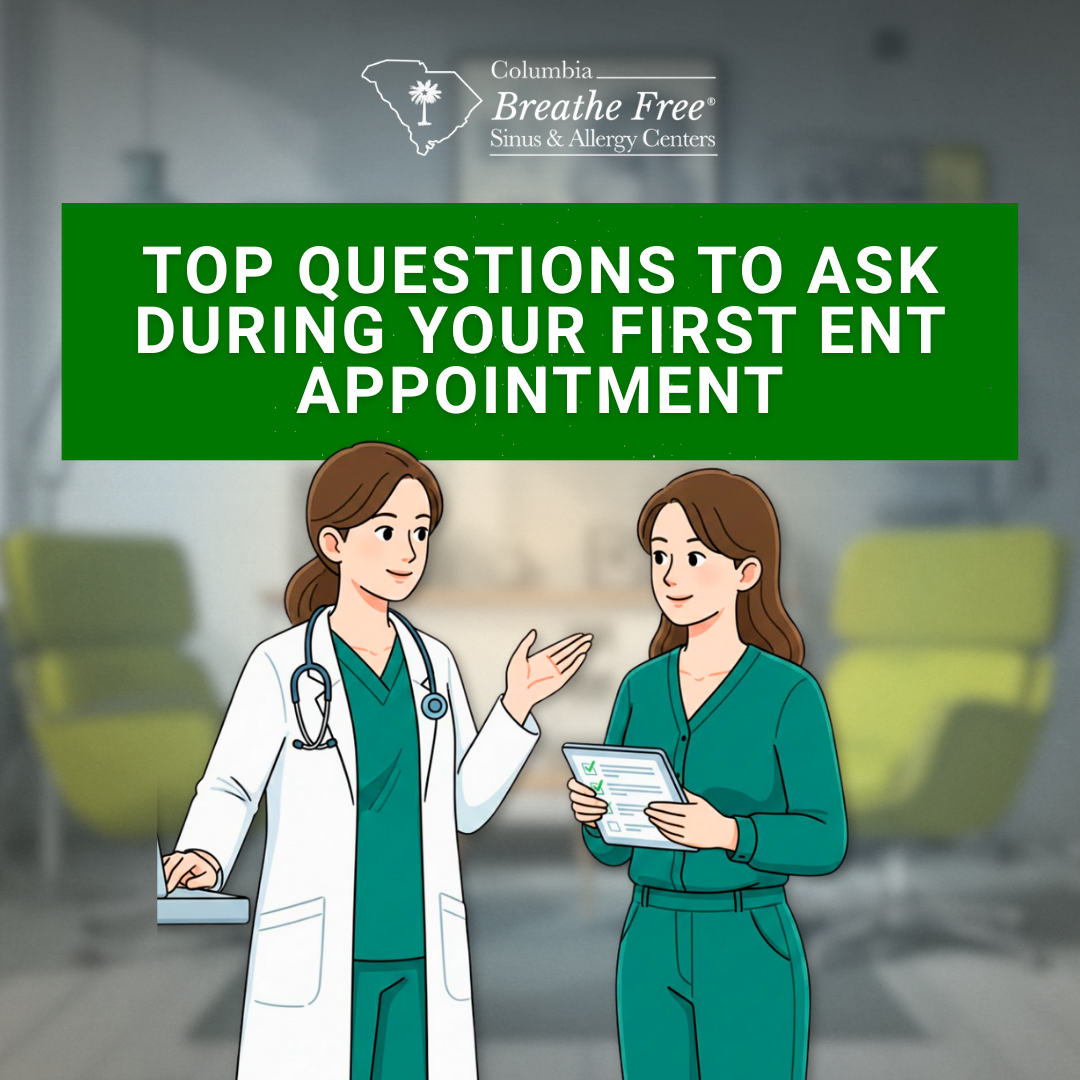.png)
Columbia’s Hidden Allergy Triggers: What Adults Should Watch For Year-Round
When most people in Columbia, SC, think of allergies, they picture springtime pollen floating through the air. But the truth is, many allergy triggers stick around all year — and they’re often hiding right inside your home, office, or workplace. If you’re an adult dealing with stuffy sinuses, sneezing, or nagging headaches, you might be reacting to more than just the outdoors.
At Columbia Breathe Free, we work with adults to help uncover potential causes behind their sinus and allergy symptoms. Let’s take a look at some of the hidden allergies in Columbia, SC, that could be affecting your daily life — and what you can do about them.

Indoor Mold: The Allergy You Can’t Always See
Mold doesn’t just grow in damp basements or old bathrooms. In humid places like Columbia, it can show up behind walls, under carpets, or even in your air conditioning system. Because it’s often hidden, mold may contribute to allergy-like symptoms without you even realizing it’s there.
Mold spores have been associated with sinus pressure, coughing, itchy eyes, and more. To reduce exposure, check for signs of leaks, use a dehumidifier in damp areas, and clean spaces like bathrooms regularly. If you suspect mold is causing problems and can’t find the source, it may be time to consult a professional — or visit a Columbia ENT specialist to assess whether mold is a potential trigger for your sinus issues.
Dust Mites: A Common Culprit in Columbia Homes
You can’t see dust mites, but they’re in just about every home — especially in beds, couches, and carpets. These tiny creatures feed on dead skin cells and thrive in warm, humid environments. For many adults, dust mites are a hidden allergy trigger that leads to year-round stuffiness and sinus discomfort.
Simple steps like washing bedding in hot water once a week, vacuuming with a HEPA filter, and using dust-mite-proof covers on pillows and mattresses can help. If you’re waking up with a stuffy nose or sinus pressure most mornings, dust mites could be contributing to your symptoms.
Pet Dander: More Than Just Pet Hair
Even if you’re not allergic to pet hair, you might still react to pet dander — the tiny flakes of skin animals naturally shed. Dander sticks to furniture, carpets, and clothing, making it easy to breathe in even if the pet isn’t nearby. In Columbia’s humid climate, dander can also combine with other allergens like dust and mold, compounding sinus symptoms.
To cut down on pet dander at home, bathe pets regularly, vacuum often, and keep them out of bedrooms. An air purifier with a HEPA filter can also help clear the air. If you’re still noticing symptoms, a local ENT provider in Columbia can help evaluate whether pet dander is contributing to your discomfort.
Workplace Triggers: Allergens Don’t Stop at Home
You might expect allergens at home — but what about the office or your workplace? Dusty vents, old carpets, moldy breakrooms, or even certain cleaning products can set off sinus and allergy symptoms for adults during the workday. If you feel fine at home but notice symptoms at work, you could be reacting to hidden environmental triggers.
Try keeping your workspace clean, asking about air filter maintenance, and using personal air purifiers if needed. If symptoms continue, an ENT in Columbia can help identify the cause and create a treatment plan that fits your lifestyle.
When to See a Columbia ENT
If sinus pressure, congestion, or allergy-like symptoms persist for weeks — even after making changes at home or work — it may be time to see a specialist. Hidden allergy triggers in Columbia, SC, can affect anyone, not just children or those with a history of allergies.
At Columbia Breathe Free, we help adults find lasting relief. Whether it’s diagnostic testing, personalized treatment options, or ongoing support, we’re here to help you manage your symptoms more effectively and breathe easier throughout the year.
Other Blogs

5 Signs It’s Time to See an ENT (and Not Just Your Primary Doctor)
If you’ve ever dealt with persistent ENT issues like chronic nasal congestion, recurring ear infections, severe sinus pain and pressure, and hearing difficulties, then you know how they may affect your daily life, productivity, and comfort, depending on their severity. Many patients today are taking a more proactive approach to their health and may choose to seek care when they notice persistent or worsening symptoms.

ENT Near Me in Columbia: What Patients Should Check Before Scheduling an Appointment
Searching for an “ENT near me” in Columbia often means you’re dealing with ongoing ear, nose, throat, allergy, or sinus concerns. This article explains what ENT providers typically evaluate and how local environmental factors may influence symptoms, along with what to expect during an ENT visit and how treatment options are commonly discussed. It also covers practical considerations before scheduling, including services offered, insurance, accessibility, and appointment availability, and highlights how Columbia Breathe Free helps patients take informed first steps toward understanding and managing persistent ENT, allergy, and sinus symptoms.

Top Questions to Ask During Your First ENT Appointment
A first visit to an ENT specialist can feel overwhelming, especially when dealing with ongoing ear, nose, or throat symptoms. This blog outlines key questions patients may consider asking during their first ENT appointment, including topics related to diagnosis, treatment options, symptom impact, and costs. It also offers practical guidance on how to prepare for an ENT visit and what to expect, helping patients in Columbia, SC make the most of their initial consultation.
The information provided in this article is for informational and educational purposes only and does not constitute medical advice. It is not intended to diagnose, treat, cure, or prevent any disease or medical condition. Always seek the guidance of your physician or other qualified healthcare provider with any questions you may have regarding a medical condition or treatment.
Results may vary: Treatment outcomes and health experiences may differ based on individual medical history, condition severity, and response to care.
Emergency Notice: If you are experiencing a medical emergency, call 911 or seek immediate medical attention.
